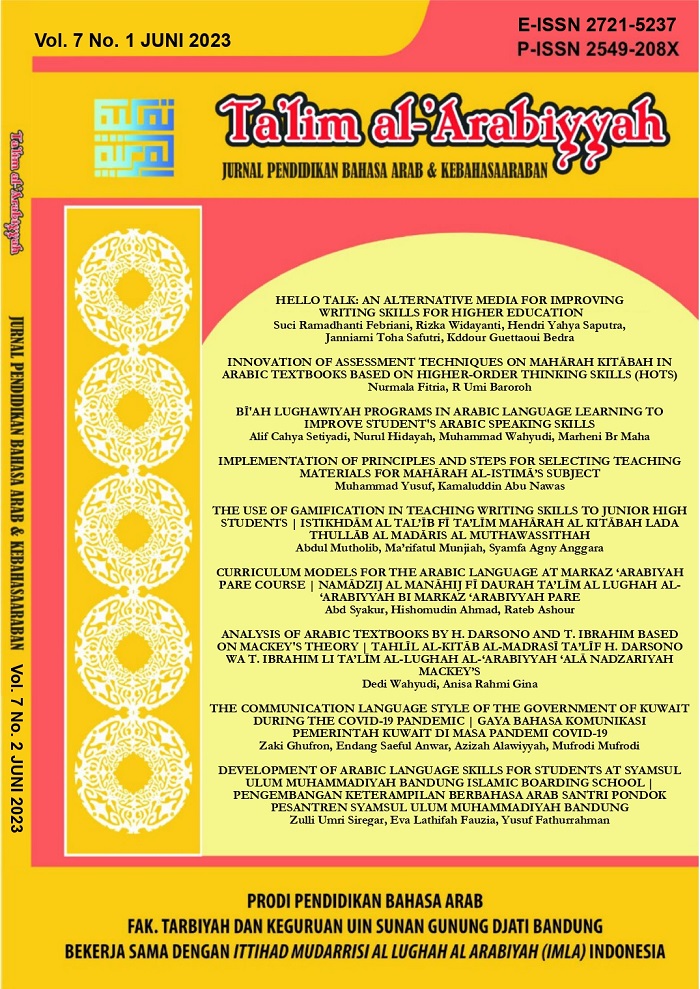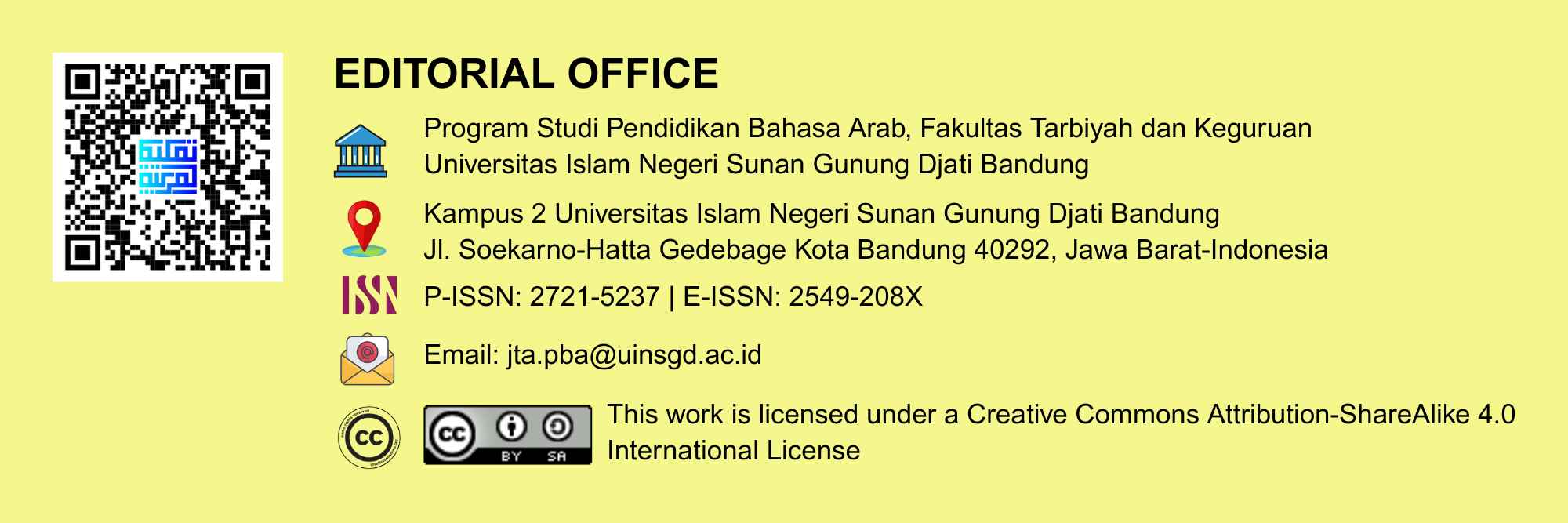Implementation of Principles and Steps for Selecting Teaching Materials for MahÄrah Al-IstimÄ’s Subject
DOI:
https://doi.org/10.15575/jpba.v7i1.19963Keywords:
Arabic Learning, MahÄrah Al IstimÄ', Teaching MaterialsAbstract
This article aims to analyze the implementation of the principles and steps in selecting teaching materials for the mahÄrah al istimÄ'. Using qualitative research, data were collected through observations, interviews, and documentation guided by instruments in the form of guidelines for each technique. The collected data is then systematized and analyzed based on the chosen theory guidance. The research findings show that the selection of teaching materials for learning the mahÄrah al istimÄ' subject is still experiencing several obstacles. However, the selection of teaching materials follows the learning objectives, and the needs of students, describing the background and atmosphere experienced by students, easy and economical to use. The steps for selecting teaching materials consist of identifying the aspects contained in the standard of competence and basic competence, identifying the types of learning materials, and choosing the types. The steps and principles of selecting teaching materials cannot be fully applied due to various factors.
References
Al Yahya, A. I. S. S. (2022). At-Tafkîr al-Ibdâ’i wa Ahammiyyâtuhu ladâ Muta’allim al-Lughah al-‘Arabiyyah li Ghairi an-Nathiqîn Bihâ. International Journal of Arabic Language Teaching, 4(2), 174–190. https://doi.org/10.32332/ijalt.v4i02.5014
Aldhafiri, M. D. (2020). The Effectiveness Of Using Interactive White Boards In Improving The Arabic Listening Skills Of Undergraduates Majoring In Arabic Language At Kuwaiti Universities. Education and Information Technologies, 25(5), 3577–3591. https://doi.org/10.1007/s10639-020-10107-5
Al-Khayyat, A. S. J. (2020). Exploring the Educational Digital Learning Systems Utilized by EFL Postgraduate Students During the Covid-19 Pandemic Quarantine. PalArch’s Journal of Archaeology of Egypt/Egyptology, 17(6), 11481–11488. Retrieved from https://archives.palarch.nl/index.php/jae/article/view/2939
Al-Thubaiti, Y. R. (2020). The Reality of Using Active Learning Strategies among Secondary School Female Teachers of Arabic Language in Taif City. Journal of Educational and Psychological Studies [JEPS], 14(2), 270–288. https://doi.org/10.53543/jeps.vol14iss2pp270-288
Alzamil, J. (2021). Listening Skills: Important but Difficult to Learn. Arab World English Journal, 12(3), 366–374. https://doi.org/10.24093/awej/vol12no3.25
Amirudin, N. (2017). Problematika Pembelajaran Bahasa Arab. Tamaddun: Jurnal Pendidikan dan Pemikiran Keagamaan, 7(2), 1–12. http://dx.doi.org/10.30587/tamaddun.v0i0.66
Ansori, M. F. (2022). Kompetensi Pedagogik Guru Dalam Inovasi Pembelajaran Bahasa Arab. Al-Miskawaih: Journal of Science Education, 1(2), 273–296. https://doi.org/10.56436/mijose.v1i2.174
Awaludin, A. (2019). Resource Based Learning for Teaching Arabic. Ijaz Arabi Journal of Arabic Learning, 2(1), 77–91. https://doi.org/10.18860/ijazarabi.v2i1.6612
Fathoni, M. (2018). Pembelajaran Maharah Istima’. Jurnal Ihtimam, 1(1), 199–218. https://doi.org/10.36668/jih.v1i1.162
Febriani, S. R., & Anasruddin, A. (2020). Technology For Four Skills Arabic In The Era Emergency Of Covid-19 In Indonesia. Ta’lim al-’Arabiyyah: Jurnal Pendidikan Bahasa Arab & Kebahasaaraban, 4(1), 1–11. https://doi.org/10.15575/jpba.v4i1.8221
Gailea, N., Syafrizal, S., & Indasari, I. (2018). Materials selection in teaching English skills for teachers of Senior High School in Serang City. Journal of English Language Teaching and Cultural Studies, 1(2), 90–102. http://dx.doi.org/10.48181/jelts.v1i2.7736
Jamilatussa’diyah, J. (2020). ‘AlÄqah DilÄliyyah Bayna AlfÄdz SakÄ«nah Wa Mawaddad Wa Rahmah FÄ« Al QurÄn Al KarÄ«m. Ta’lim al-’Arabiyyah: Jurnal Pendidikan Bahasa Arab & Kebahasaaraban, 3(2), 88–101. https://doi.org/10.15575/jpba.v3i2.7873
Jannah, N. A. S., Nurhidayati, N., & Ahsanuddin, M. (2022). Utilization of Materials “Academic Arapça†for Listening Skills in Arabic Language Education. Arabiyat : Jurnal Pendidikan Bahasa Arab dan Kebahasaaraban, 9(2), 191–204. https://doi.org/10.15408/a.v9i2.28971
Lutfiyatun, E. (2022). Optimasi Keterampilan Menyimak Bahasa Arab Dengan Media Youtube. Tarbiyatuna: Jurnal Pendidikan Ilmiah, 7(1), 1–14. https://doi.org/10.55187/tarjpi.v7i1.4821
Mohamad, N., Puasa, B., Maromar, F., Wan Abd Rahman, A., & Hassan, L. (2022). Non-native Arabic Students’ Perception on Virtual Communication Program with Native Speakers. International Journal of Academic Research in Business and Social Sciences, 12(6), 373–391. https://doi.org/10.6007/IJARBSS/v12-i6/13254
Muradi, A., Mubarak, F., Darmawaty, R., & Hakim, A. R. (2020). Higher Order Thinking Skills Dalam Kompetensi Dasar Bahasa Arab. Arabi : Journal of Arabic Studies, 5(2), 177–190. https://doi.org/10.24865/ajas.v5i2.293
Muradi, A., & Taufiqurrahman, T. (2021). Pengembangan Kurikulum Pembelajaran Bahasa Arab Konsep dan Aplikasi. Rajawali Pers.
Nur Alfiani, E. (2022). Pengembangan Handout CEKAP sebagai Bahan Ajar Bahasa Arab untuk Siswa Kelas VI Madrasah Ibtidaiyah. Alsina : Journal of Arabic Studies, 4(2), 167–188. https://doi.org/10.21580/alsina.4.2.10214
Purnamaningwulan, R. A. (2022). Listening journals to promote students’ critical thinking skills in an integrated Listening-Speaking Course. Studies in English Language and Education, 9(2), 744–760. https://doi.org/10.24815/siele.v9i2.23387
Saidah, U., Bin-Tahir, S. Z., & Mufidah, N. (2018). Arabic Teacher’s Competence: A Case of Madrasah Schools in Maluku. Ijaz Arabi Journal of Arabic Learning, 1(2), 139–150. https://doi.org/10.18860/ijazarabi.v1i2.5584
Salam, M. Y., Asrori, I., Mudinillah, A., & Sayyid Ibrahim, M. A. A. (2022). Arabic Language Learning For Elementary Schools During Pandemic Covid-19. Ijaz Arabi Journal of Arabic Learning, 5(2), 446–458. https://doi.org/10.18860/ijazarabi.v5i2.16074
Saricayir, H., Ay, S., Comek, A., Cansiz, G., & Uce, M. (2016). Determining Students’ Conceptual Understanding Level of Thermodynamics. Journal of Education and Training Studies, 4(6), 69–79. https://doi.org/10.11114/jets.v4i6.1421
Susanto, Apri Wardana Ritonga, Ayu Desrani, & Yohan Rubiyantoro. (2022). Arabic Learning Design Based on 21st Century Skills during the Covid-19 Pandemic in Indonesia. Jurnal Iqra’ : Kajian Ilmu Pendidikan, 7(2), 1–14. https://doi.org/10.25217/ji.v7i2.2235
Syaifullah, M., & Izzah, N. (2019). Kajian Teoritis Pengembangan Bahan Ajar Bahasa Arab. Arabiyatuna : Jurnal Bahasa Arab, 3(1), 127–144. https://doi.org/10.29240/jba.v3i1.764
Thohir, M., & Dzakiruddin, M. (2022). Popular Phonetic Mapping in The Qur’an and Its Implications on Teaching Arabic for Non-Native Speakers. Jurnal Al Bayan: Jurnal Jurusan Pendidikan Bahasa Arab, 14(1), 20–39. https://doi.org/10.24042/albayan.v14i1.9757
Wahdah, Y. A., Najihah, N., & Nasiruddin, N. (2023). Karakteristik Pengembangan Kurikulum Bahasa Arab MahÄrah QirÄah Dan KitÄbah. Al Mi’yar: Jurnal Ilmiah Pembelajaran Bahasa Arab dan Kebahasaaraban, 6(1), 257–278. https://doi.org/10.35931/am.v6i1.1640
Wahyuni, M. E., & Inayati, N. (2022). The Strategies in Learning English Listening Skills Used by The Eighth-Graders. Journal of Foreign Language Teaching and Learning, 7(2), 160–177. https://doi.org/10.18196/ftl.v7i2.14504
Wahyuni, S., Ritonga, M., & Afrianti, W. (2023). Systematic Review of Learning Method for Teaching Arabic Listening and Speaking Skills. Al-Hayat: Journal of Islamic Education, 7(1), 30–41. https://doi.org/10.35723/ajie.v7i1.321
Zain, M. (2017). Pengembangan Strategi Pembelajaran dan Pemilihan Bahan Ajar. Inspiratif Pendidikan, 6(1), 172–178. https://doi.org/10.24252/ip.v6i1.4925
Zarkasyi, A. H., Fauziah, S. A. B. N., & Hanina, G. (2022). Developing Teaching Aids For The Arabic Language Book In Reading Skill On PowerPoint Android. Ijaz Arabi Journal of Arabic Learning, 5(2), 332–342. https://doi.org/10.18860/ijazarabi.v5i2.15480
Zrekat, Y., & Al-Sohbani, Y. (2022). Arab EFL University learners’ perceptions of the factors hindering them to speak English fluently. Journal of Language and Linguistic Studies, 18(1), 775-790. Retrieved from https://www.jlls.org/index.php/jlls/article/view/3642
Zulharby, P., Rasyid, Y., & Nuruddin, N. (2019). The Characteristics of Teaching Material Arabic Speaking Skills in Higher Education. Jurnal Al-Bayan: Jurnal Jurusan Pendidikan Bahasa Arab, 11(2), 194–213. https://doi.org/10.24042/albayan.v11i2.5175
Downloads
Published
How to Cite
Issue
Section
Citation Check
License
Authors who publish in Ta'lim al-'Arabiyyah: Jurnal Pendidikan Bahasa Arab dan Kebahasaaraban agree to the following terms:
- Authors retain copyright and grant the journal right of first publication with the work simultaneously licensed under a Creative Commons Attribution-ShareAlike 4.0 International (CC BY-SA 4.0) License that allows others to share the work with an acknowledgment of the work's authorship and initial publication in this journal.
- Authors are able to enter into separate, additional contractual arrangements for the non-exclusive distribution of the journal's published version of the work (e.g., post it to an institutional repository or publish it in a book), with an acknowledgment of its initial publication in this journal.
- Authors are permitted and encouraged to post their work online (e.g., in institutional repositories or on their website) prior to and during the submission process, as it can lead to productive exchanges, as well as earlier and greater citation of published work (See The Effect of Open Access).
![]()
Ta'lim al-'Arabiyyah: Jurnal Pendidikan Bahasa Arab dan Kebahasaaraban is licensed under a Creative Commons Attribution-ShareAlike 4.0 International License.
Based on a work at https://journal.uinsgd.ac.id/index.php/Talim








